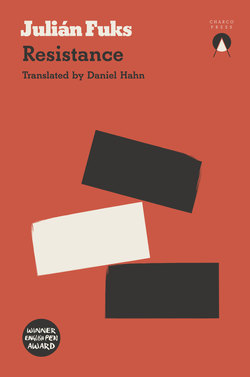Читать книгу Resistance - Julián Fuks - Страница 18
На сайте Литреса книга снята с продажи.
Оглавление12.
Guns under my father’s bed. I think about those guns, I allow them to exist in my consciousness. From an extensive repertoire of false scenes I pick out an image of their presence: a few revolvers locked in a wooden box, a sheet covering the box with studied carelessness, all in the dim light filtering through the only open window, curtains trembling in the breeze. I don’t understand the fascination they exert when I imagine them like this, in my father’s house, under his single bed. My whole life I’ve had an aversion to these objects, an uncomfortable confluence of real danger and deadly symbol. All my life I’ve seen myself as a pacifist. Now I think about those guns and I don’t understand the euphoria I feel, the vanity assailing me, as if the story of my father’s life were conferred upon me: I am the proud son of a leftist guerrilla fighter and this partly justifies me, this redeems my own inertia, this inserts me precariously into a lineage of non-conformists.
I am the age my father was then – old enough to know that his guns are not mine, that it isn’t up to me to grasp them and make him my brother in arms, that all that’s left for me is to probe ideas, to try to understand those weapons. If I still have not understood, maybe it’s because they were never a decisive bit of information, an uncontested piece of data, they have never existed without their own eloquent denial. No, we never had guns under our bed, my mother contradicts him with the same firmness each time, and each time he accepts, he conforms, he acquiesces. Then he allows himself to be carried away by a vague monologue about the utopian horizon of those days, the focalist theory of revolution preached by Che, the many Vietnams fought against imperialism, the Cuban Revolution as an auspicious example, the Sandinismo in which some of their friends also became involved. No, my mother gets annoyed now, Who?, she wants to know, and there follows a long list of names I’ve overheard in their conversations before, names that she listens to, waiting for the eventual slip: no, not him, Alberto, or Carlos, or Vicente, he wasn’t mixed up in all that. What do you mean he wasn’t, he even went to Cuba! He went to Cuba because his brother-in-law lived in Havana, my mother responds. He went to Cuba to do his training to fight in Nicaragua, my father insists this time, impatient now, having already forgotten the figure watching them in silence, the figure who doesn’t know who to believe.
There’s always a tension in the argument over these details, as if each little fact did not simply consist of itself, of its evident smallness, subjugated to some greater version of events. There are also relics of tensions left over from previous decades, a bygone reticence deferring every line they allow themselves to speak, an anachronistic sense of confidentiality, of unconfessable secrets, as if revealing this information and naming those involved were an indiscretion that would be censured by the movement – or, worse, punished by the tenacious executioners of a harsh regime. Sometimes they seem to lower their voices when they mention a specific incident, sometimes they stutter, they break stories off half-told, and I have the clear impression that they are still afraid of our ears – that we are still, in their eyes, children to be spared the brutality of the world, or even dangerous double agents who will one day inadvertently turn them in.
But who, this is what I then ask, who would even be interested today in the petty meanderings of a distant time, and the answer my father always gives is an absurd mix of delirium and clarity: dictatorships can come back, you should know that. Dictatorships can come back, I know, and I also know that the arbitrariness, the oppressions, the suffering, exist in all kinds of ways, in all kinds of regimes, even when hordes of citizens march biennially to the ballot box – that’s what I think when I hear him but I stop myself from saying it, to spare him the brutality of the world or out of some fear that he won’t understand me.
Almost everything they tell me, they contradict; almost everything I want to tell them catches in my throat and discourages me. I know and I don’t know that my father belonged to a movement, I know and don’t know that he was trained in Cuba, I know and don’t know that he never fired a well-aimed shot, that he just took care of people injured in street battles, looked for new recruits, preached Marxism in the shanty towns. He knows and doesn’t know that I’m writing this book, and that this book is about my brother but also about them. When he finds out, he says he’s going to send me the Operation Condor document in which his name appears. I ask him to send it, but I don’t tell him I want to include it in the book, that I’m planning, ridiculously, to certify my invention with a document. Ashamed, perhaps, at his own vanity, he never sends me the file; I never ask him for it again, being ashamed too.
